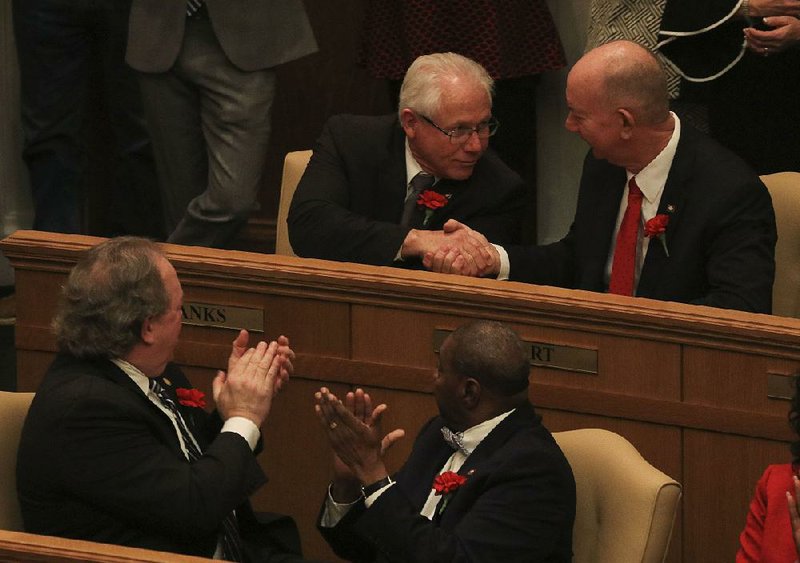The governor-backed effort to raise Arkansas' minimum teacher salary cleared its first legislative hurdle Tuesday.
House Bill 1145 by Rep. Bruce Cozart, R-Hot Springs, would raise the bottom salary for teachers of all experience levels by $1,000 annually over the next four years.
A starting teacher with a bachelor's degree today makes $31,800 a year. Under Cozart's legislation, that teacher would make $32,800 next year and $36,000 by 2023.
Cozart's bill, which will now go before the full House, would not affect teachers in school districts that pay above the state-mandated minimum salary levels.
The bill is one of Gov. Asa Hutchinson's legislative priorities, and raising teacher pay was a key part of his re-election campaign last year. The legislation was also recommended by a panel of lawmakers that studies Arkansas' education funding needs every two years.
HB1145 passed the House Education Committee without audible dissent Tuesday, but several lawmakers expressed concerns about the future.
[RELATED: Complete Democrat-Gazette coverage of the Arkansas Legislature]
The executive branch has identified $60 million in state funds to help school districts in depressed areas afford the mandatory pay raises. However, that pot of money will run out after the raises are fully implemented in four years. That worried several representatives who said school districts will still be on the hook to continue paying teachers at the higher rate.
Some lawmakers asked how those districts will afford that.
"Surely someone is already thinking about some kind of proposals, and hopefully, it has less to do with raising millages," said Rep. LeAnne Burch, D-Monticello.
Cozart, who chairs the House Education Committee, said legislators will figure that out over the next 18 months, referring to the biennial education adequacy study that the House and Senate Education Committees conduct.
Arkansas' starting teacher salary remained stagnant from 2009-15; the Legislature has raised the lowest salary each year since then.
Arkansas's minimum teacher salary schedule ranks in the middle among states in its region, but under HB1145, only Alabama would have a higher minimum teacher salary range.
In 2018, 173 of the state's 238 school districts paid teachers the minimum salary.
"What do we do when four years is gone?" Cozart said, referring to the time needed to raise pay. "Well, that's up to us. As a legislative body, we are charged with that. We've been charged with fixing adequacy and trying to make it better. Every two years we do that."
Every two years, the House and Senate Education Committees generate a report with recommendations for funding increases for various components of the education funding formula.
But in recent years, lawmakers from both parties have questioned the formula itself. The committee agreed this year to hire a third party to study the funding formula and recommend changes.
The study and the biennial report stem from 2003 legislation passed in the wake of the Arkansas Supreme Court's Lake View School District No. 25 v. Huckabee decision that declared the state's public school funding system inadequate and unconstitutional. The biennial study sets out the per-student funding amount, which is $6,781 per student in the 2018-19 school year.
The Arkansas Education Association thanked Cozart for taking "the first step" with HB1145, but Executive Director Tracey-Ann Nelson said that teachers still make less than similarly skilled professionals.
"If we want to get serious about ensuring student success, we have to look holistically at funding for public education, beyond teacher pay," Nelson said. "We are encouraged by comments from multiple lawmakers who want to push for more meaningful investment moving forward."
"There will be districts that feel like they're being left out here," state Education Commissioner Johnny Key said. "We're trying to play catch-up here. Because from the years 2009 to 2015, there were no increases in the minimum salary schedule. So in that period of time some districts continued to move forward; some stayed at the base level. We're trying to make up for lost time here."
A Section on 02/06/2019
